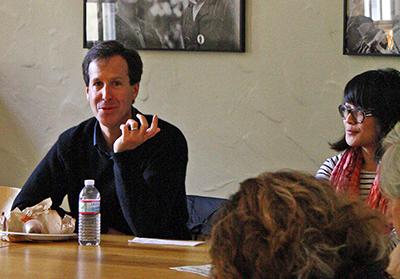Three Weeks with Dan Cohen: A DH Microcosm

Last year, Professor Tom Laqueur asked me to recommend someone to invite to apply for a Townsend Avenali Resident Fellowship in history who would enhance our efforts in the area of digital humanities and computational social sciences. Dan Cohen was an obvious choice. Currently the Director of the Roy Rosenzweig Center for History and New Media at George Mason University, Professor Cohen is a true leader in the digital humanities and computational social sciences, so we were delighted that he agreed to come.
In anticipation of his residency, my colleague Rochelle Terman wrote about Professor Cohen’s contributions in a post that can be found here. Rather than repeat what has already been said, this post will reflect on Professor Cohen’s visit.
Professor Cohen’s invitation to be the Avenali Resident Fellow in history fits within a larger effort to build a digital humanities and computational social sciences community across disciplines, units, and fields here at UC Berkeley, so that researchers might be able to take better advantage of the rich resources and many talents spread about campus. To the late Roy Rosenzweig, Professor Cohen’s predecessor and founder of CHNM, community building was necessary to fulfill the promise of digital technology. In his own work at the center, Professor Cohen carries this torch. His ‘big-tent,’ inclusive approach to digital methods, his vast knowledge of resources and projects, and his friendly demeanor all helped to further invigorate us in our efforts to create connections among Berkeley's immense but often disjointed resources and talent.
During his stay, Professor Cohen gave a public lecture on the changing nature of scholarly research and communication for the Computing and the Practice of History series, he led a discussion on Digital Humanities institutions for a new Townsend Brown Bag series (information about future events can be found here), he conferred with our Townsend-sponsored Digital Humanities Working Group, and he met individually with faculty, librarians, and graduate students. In addition, a major portion of his visit was dedicated to leading a special seminar, which was hosted in the new Social Sciences Data Lab (D-Lab).
In six meetings over three weeks, this seminar was a crash-course on digital scholarly methods, covering first-principles and methodological issues in several areas while introducing a panoply of new research tools. As it turns out, in ways both anticipated and surprising, Professor Cohen’s digital methods seminar proved to be a microcosm of the state of the digital humanities and computational social sciences, both here at Berkeley and in the world at large.
The seminar’s participants included junior faculty and graduate students from several fields of humanities and social sciences, from computer science, and from the School of Information, alongside librarians from the Bancroft and the Law Library, and IST staff. Among this group, computational abilities were as varied as fields: some participants were very much still beginners, others had robust technical skill sets, and at least one has recently been offered a job at Google.
Such diversity is no accident. As Professor Cohen has himself emphasized on many occasions, digital scholarly methods require multiple skill sets from several disciplines and fields. Hence, CHNM has computing specialists and designers working alongside its historians, and the Maryland Institute for Technology in the Humanities (MITH) is closely allied with the University of Maryland’s libraries. To wit: digital scholarly methods demand interdisciplinary collaboration.
 Aiming to foster that sort of exchange, D-Lab graciously opened its freshly hung doors a bit early to welcome us for Professor Cohen’s class, and the lingering traces of construction in D-Lab suited our seminar well. After all, in the words of Timothy Hitchcock delivering the inaugural Computing and the Practice of History lecture in 2011, “we are halfway through a revolution.” Indeed, there we were, sitting around a cluster of borrowed tables in an unfinished lab, its wires still not hidden away, paint still wet on the walls, Professor Cohen reminding us that much work remains to be done.
Aiming to foster that sort of exchange, D-Lab graciously opened its freshly hung doors a bit early to welcome us for Professor Cohen’s class, and the lingering traces of construction in D-Lab suited our seminar well. After all, in the words of Timothy Hitchcock delivering the inaugural Computing and the Practice of History lecture in 2011, “we are halfway through a revolution.” Indeed, there we were, sitting around a cluster of borrowed tables in an unfinished lab, its wires still not hidden away, paint still wet on the walls, Professor Cohen reminding us that much work remains to be done.
It was truly a pleasure to join Professor Cohen for three weeks in this digital humanities microcosm, with all of our diverse interests and backgrounds, exploring the contours of a still very unfinished field.